PART A: THE CULTURE OF SEPARATENESS
 [dropcap]a revolution, and soon, and it must be the right kind of revolution, or we’re all going to die. Total extinction of our species, along with most other species on our planet, can only be averted by a cultural transformation bigger than any we’ve had in 10,000 years, so big that many people will identify it as the Rapture.
[dropcap]a revolution, and soon, and it must be the right kind of revolution, or we’re all going to die. Total extinction of our species, along with most other species on our planet, can only be averted by a cultural transformation bigger than any we’ve had in 10,000 years, so big that many people will identify it as the Rapture.
That transformation can only come about through an idea gone viral, a revealing of a fundamental truth. It’s a truth that we’ve known all along — that love is better than money — but we need to understand it in a new way. It has been hidden in plain sight, right under our noses; to see it, we just need to focus our vision a little differently.
Sure, I realize that such apocalyptic alarmist claims sound preposterous, but I’ll give reasons for them in this essay. And yes, even to me the chance seems remote that everyone will get off their apathetic butts and get involved soon, but it’s still possible. After all, an idea can spread very quickly when its time has come, when the need for it has become blatantly obvious. My main fear is that the coming revolution will be too small, led by people who don’t see what drastic changes we really need.
 Many people feel overwhelmed, because our problems seem so numerous —
Many people feel overwhelmed, because our problems seem so numerous —
[box type=”bio”] ALEC, alienation, animal abuse, apathy, authoritarianism, banksters, bee dieoffs, bullying, censorship, CFR, Chamber of Commerce, chemtrails, child abuse, colonialism, corruption, cruelty, deforestation, desertification, disinformation, exploitation, Federal Reserve, foreclosures, global warming, GMOs, greed, hate, homelessness, homophobia, hunger, ignorance, imperialism, inadequate healthcare, incarceration, Islamophobia, lies, loneliness, media consolidation, mercury in fish, militarism, money in politics, neglect of the elderly, nuclear meltdowns, NRA, NWO, ocean acidification, oil spills, overfishing, pay toilets, peak everything, pedophilia, plutocracy, poverty, racism, rape, sexism, slavery, spousal abuse, theft of the entire economy, topsoil erosion, unemployment, unsustainability, unverifiable ballots, war, xenophobia …[/box]
All these problems are solvable, but not with our current methods. In fact, these problems daily grow more fierce and more numerous, like the heads of the mythical Hydra that Hercules fought. Treating the symptoms is ineffective; we must understand and treat the underlying disease. In this essay I will explain that the root cause of all these evils is our culture of separateness, both economic and psychological. By “culture” I mean how we see the world all around us and inside us, and how we interpret the significance of what we see. The culture is inside all of us, not just the ruling class; that class will only fall when the rest of us see more clearly, transcending our present culture and building a new one.
 Some activists blame our problems on the greed of the rich and powerful, as though the root cause is their personal moral failure. But I see greed as consequence, not source. Greed is generated by economic inequality, an inevitable consequence of the institution of private property. So our problems are systemic, not personal: They originate in a system in which we’ve all been participating.
Some activists blame our problems on the greed of the rich and powerful, as though the root cause is their personal moral failure. But I see greed as consequence, not source. Greed is generated by economic inequality, an inevitable consequence of the institution of private property. So our problems are systemic, not personal: They originate in a system in which we’ve all been participating.
We’ve lived with private property for 10,000 years, and it’s deeply ingrained in our culture. But for 100,000 years before that we shared  everything of importance, and that’s still our genetic nature. We must return to sharing soon, for reasons that I’ll explain.
everything of importance, and that’s still our genetic nature. We must return to sharing soon, for reasons that I’ll explain.
Economic separateness has become a part of our daily lives, so basic that we don’t even think about it: You keep your stuff in your house, and I keep my stuff in my house. But then we perceive our lives as separate, and we adopt an attitude of
apathy: your well being is not my concern.
In a healthy society, an isolated case of apathy would be easily dealt with: The many people who care about an uncaring person would gently coax him back into the fold. But apathy is harder to uproot after it becomes widespread and matures into a symmetric form,
psychological separateness: your well being is not my concern, and my well being is not your concern.
 This attitude isn’t greedy: It doesn’t demand anything from others. Its symmetry makes it an instance of the Golden Rule, “treat others as you wish to be treated,” often touted as our society’s highest morality, but it’s a rather negative version of that rule: I won’t care about you, and I don’t wish for you to care about me. Ayn Rand presented selfishness as a logical philosophy, and independence as a heroic way of life. Her followers believe that it’s possible to respect other people without actually caring about them or being interdependent with them — but they’re mistaken. When we don’t care about something, we see it as an object to be used.
This attitude isn’t greedy: It doesn’t demand anything from others. Its symmetry makes it an instance of the Golden Rule, “treat others as you wish to be treated,” often touted as our society’s highest morality, but it’s a rather negative version of that rule: I won’t care about you, and I don’t wish for you to care about me. Ayn Rand presented selfishness as a logical philosophy, and independence as a heroic way of life. Her followers believe that it’s possible to respect other people without actually caring about them or being interdependent with them — but they’re mistaken. When we don’t care about something, we see it as an object to be used.
 And although most people in our society see Ayn Rand for the sociopath that she was, nevertheless her ideology has won: Our basic nature — which is really empathic and cooperative — has been swamped by a culture of separateness, cynicism, and competition. Separateness is as ubiquitous and unquestioned as the air we breathe; it’s implicit in the corporate media’s depiction of our lives, in both news and drama. Sharing is praised as saintly or condemned as heretical, but in any case excluded from models of normalcy that are offered for us to imitate. The psychological consequences have been grave: Seeing strangers as uncaring, we grow pessimistic and cynical, and focus on just surviving. Lacking meaning and community, we feel empty and anxious, and we numb ourselves with entertainments and pills. Isolated, we feel powerless, helpless, and hopeless; any efforts at changing the world seem futile and pointless.
And although most people in our society see Ayn Rand for the sociopath that she was, nevertheless her ideology has won: Our basic nature — which is really empathic and cooperative — has been swamped by a culture of separateness, cynicism, and competition. Separateness is as ubiquitous and unquestioned as the air we breathe; it’s implicit in the corporate media’s depiction of our lives, in both news and drama. Sharing is praised as saintly or condemned as heretical, but in any case excluded from models of normalcy that are offered for us to imitate. The psychological consequences have been grave: Seeing strangers as uncaring, we grow pessimistic and cynical, and focus on just surviving. Lacking meaning and community, we feel empty and anxious, and we numb ourselves with entertainments and pills. Isolated, we feel powerless, helpless, and hopeless; any efforts at changing the world seem futile and pointless.
 As I’ve already remarked, the habit of private property generates a philosophy of unconcern. Conversely, that philosophy justifies private property. Thus, the economy and psychology generate each other; I’ll refer to them both as separateness.
As I’ve already remarked, the habit of private property generates a philosophy of unconcern. Conversely, that philosophy justifies private property. Thus, the economy and psychology generate each other; I’ll refer to them both as separateness.
At first glance, separateness appears neither constructive nor destructive, but merely neutral, and its harmless appearance fools people into tolerating it. But war, poverty, ecocide, rape, bullying, and other evils could not occur if more people were concerned; thus separateness obviously permits evil. And I’ll explain that, in less obvious ways, separateness actually causes evil. On the other hand, if we overcome separateness, together we will quickly solve our shared problems.
 Yahweh never answered Cain’s question, but I would answer yes, you should be your brother’s keeper, and he should be yours. Still, I am not advocating self-denial, self-sacrifice, self-crucifixion. You are a part of the global community, and you deserve comfort and happiness as much as anyone else does. I just want you to see that your comfort and happiness are not separate from everyone else’s.
Yahweh never answered Cain’s question, but I would answer yes, you should be your brother’s keeper, and he should be yours. Still, I am not advocating self-denial, self-sacrifice, self-crucifixion. You are a part of the global community, and you deserve comfort and happiness as much as anyone else does. I just want you to see that your comfort and happiness are not separate from everyone else’s.
PART B: EXPOSING CAPITALISM
 As your property is separate from mine, we must exchange things; we must have a market. But the market is not as it seems. A false mythology is perpetuated by propaganda so ingrained in our culture that few of us notice it — it’s simply what “everybody knows” and takes for granted; our waking from it will be as great a shock as Neo’s when he woke from the Matrix.
As your property is separate from mine, we must exchange things; we must have a market. But the market is not as it seems. A false mythology is perpetuated by propaganda so ingrained in our culture that few of us notice it — it’s simply what “everybody knows” and takes for granted; our waking from it will be as great a shock as Neo’s when he woke from the Matrix.
Does the propaganda consist of intentional lies, or of unintentional mistakes? Perhaps some of each; it’s hard to tell. But it’s falsehoods either way, and they’re not really complicated; we can see through them easily enough if we just look in the right places and think a little. I’ve selected a dozen falsehoods to explain:
- “Capitalism is justified by complicated mathematical economics.” – False. The math only obscures what is really going on. I’m a professor of mathematics, and I can tell you that math only shows you the consequences of your assumptions; it doesn’t choose the assumptions. The terrible current state of the world economy stems from erroneous assumptions about human nature that economists make at the beginning of their reasoning, before they ever get to the math.
- “The problems of capitalism are few and superficial. To solve them, we just need a few reforms, to get back to our fundamental principles. The corruption is just a few bad managers.” – False. The principles themselves are faulty, so the changes we need are much deeper than mere reforms. Those “few bad managers” are inevitable byproducts of a bad system. As I’ll explain in the next few sections, capitalism itself is toxic, both materially and spiritually, even when it’s honest, and it can’t be kept honest.
- “Capitalism is democratic; free enterprise is freedom. The only alternative to separateness is Stalinist dictatorship.” – False. The word “free” in “free enterprise” is the freedom of an uncaptured pirate. Capitalism is the opposite of democracy; few people get to vote about how their workplaces are run. Jobs are structured to benefit the owners, not the workers or the community. Admittedly, we haven’t seen any long-lasting examples of voluntary sharing, but that’s because sharing communities get crushed by the armies of plutocracy. Revolutionary Catalonia, 1936-1939, was crushed by the fascists. The Paris Commune of 1871 was crushed by the troops of Versailles. Early Christians, whose sharing was described in Acts 2:44, were persecuted by the Romans until they were co-opted by Emperor Constantine. And hunter-gatherer societies generally have been “put on reservations” by expanding agricultural societies.
- “To solve the jobs problem, we need (a) more stimulus spending or (b) a balanced budget.” – BOTH false. The “jobs problem” is inherent in capitalism, no matter how it’s tweaked. Here’s why: Under any economic system, people gradually figure out better ways of doing things — better organization, more robots — and so productivity rises — i.e., we produce more goods and services per hour of labor. That’s progress, and it ought to be a good thing. But under capitalism, the owners pocket all the gains in productivity. The workers get layoffs, not leisure. Then more unemployed are competing for fewer jobs, so wages go down. That point is so important that I want to restate it: Unemployment is high and wages are low, not because of robots, but because the robots aren’t being shared.There is an irony in this: To sell his products, the employer must hope that other employers will pay decent wages.
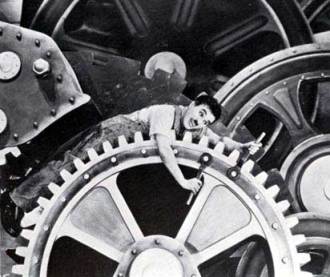 “People would quit working if we switched to guaranteed incomes; the economy would collapse.” – False, but with a qualification. People would quit if we switched to guaranteed incomes and no other changes were made. That’s because the jobs, presently structured to benefit the owners, are unsatisfying, and offer no reward other than money. There are a few exceptions — e.g., the firefighter and the nurse may find their jobs to be meaningful; they may feel good about what they are accomplishing for the community. Any job that can’t be restructured to feel good that way isn’t necessary, and should be eliminated.
“People would quit working if we switched to guaranteed incomes; the economy would collapse.” – False, but with a qualification. People would quit if we switched to guaranteed incomes and no other changes were made. That’s because the jobs, presently structured to benefit the owners, are unsatisfying, and offer no reward other than money. There are a few exceptions — e.g., the firefighter and the nurse may find their jobs to be meaningful; they may feel good about what they are accomplishing for the community. Any job that can’t be restructured to feel good that way isn’t necessary, and should be eliminated. “The desire for personal gain is the source of all creativity and innovation, which makes the world a better place. Capitalism is smart, because it harnesses greed for the good of all.“– False. Bargaining with the devil is stupid, because it always ends badly; you’re the one who will end up in the harness, and not for the good of all. Sociologists have found that monetary incentives actually decrease the motivation for creativity. In the USA, nearly all basic research happens in government-supported labs, generally either in the military or in universities. Private investors then develop minor variations on the discoveries. Thus, the cost is socialized; the profits are privatized. And when technological developments are guided mainly by profit, without regard to whether they make the world a better place, generally they don’t — in fact, generally they’re poisoning the world.
“The desire for personal gain is the source of all creativity and innovation, which makes the world a better place. Capitalism is smart, because it harnesses greed for the good of all.“– False. Bargaining with the devil is stupid, because it always ends badly; you’re the one who will end up in the harness, and not for the good of all. Sociologists have found that monetary incentives actually decrease the motivation for creativity. In the USA, nearly all basic research happens in government-supported labs, generally either in the military or in universities. Private investors then develop minor variations on the discoveries. Thus, the cost is socialized; the profits are privatized. And when technological developments are guided mainly by profit, without regard to whether they make the world a better place, generally they don’t — in fact, generally they’re poisoning the world.- “Market prices efficiently allocate goods and services to their best use.” – False. “Best” for what purposes? “Efficient” toward what goals? Hitler’s gas chambers were “efficient.” We have vacant homes and discarded food in the same cities as homeless and hungry people, because a more sane distribution system would be less profitable. Under capitalism, “natural resources” are priced at extraction cost, not at replacement and cleanup cost. The enormous difference between those costs is externalized onto the community and future generations, because the interests of the industry are separate from those of the community and future generations. Privatized, plundered, and poisoned, the ecosystem is dying. This point is important enough that I want to restate it: The ecosystem is dying, not simply because of technology, but because of technology being guided solely by private profit, without regard for the well being of society or the ecosystem.
- “Capitalism and hard work will make us all prosperous and happy.” – False. If that were enough, every woman in Africa would be a millionaire. Capitalism makes a few people rich, but generally at everyone else’s expense. And even for those few, wealth doesn’t bring happiness. Any wealth beyond basic needs does not increase happiness, and having substantially greater wealth than one’s neighbors actually diminishes community ties and thereby diminishes happiness. Capitalist USA is far behind socialist Cuba in ensuring that all its people have the necessities — housing, food, education, and healthcare.
- “People simply need to pay off their debts.” – False. It’s actually not even possible for people to pay off their debts, though that only becomes apparent when you look at the big picture. Money in our economy is created out of thin air by private banks authorized to loan out more money than they actually have; this crazy system is called “fractional reserve lending.” Because those loans bear interest, the total amount of debt is greater than the total amount of money. It’s like the game of Musical Chairs, in which there are never enough seats for everyone; people can only pay off their debts by increasing someone else’s debts. The resulting problems might be manageable if the economy could keep growing, but our planet is not getting any bigger. Gradually, capitalism has monetized more and more regions of the planet, and more and more aspects of our lives. But now there is nowhere left to grow, and so capitalism is heading toward its final crash.
 “People should simply ‘vote’ with their dollars, by boycotting bad companies; that’s how the market makes a better world.” – False. That gives more votes to wealthier people, which is one of our big problems. Consumerism perpetuates our passive, apathetic, separated way of life. And how would we know which companies to boycott? We don’t have the time, money, and skills to personally research every product or service that we buy, and many companies will take advantage of that fact. For instance, for years the cigarette companies concealed their own research showing that their product is harmful; many other companies are behaving just as badly but are not yet as well known. All large corporations behave like psychopaths, compelled by competition and by their legal charters to maximize profit, disregarding or even concealing harm to workers, consumers, and the rest of the world. And the CEOs of those businesses are psychopaths too, because any CEO who begins to show scruples will quickly be replaced.
“People should simply ‘vote’ with their dollars, by boycotting bad companies; that’s how the market makes a better world.” – False. That gives more votes to wealthier people, which is one of our big problems. Consumerism perpetuates our passive, apathetic, separated way of life. And how would we know which companies to boycott? We don’t have the time, money, and skills to personally research every product or service that we buy, and many companies will take advantage of that fact. For instance, for years the cigarette companies concealed their own research showing that their product is harmful; many other companies are behaving just as badly but are not yet as well known. All large corporations behave like psychopaths, compelled by competition and by their legal charters to maximize profit, disregarding or even concealing harm to workers, consumers, and the rest of the world. And the CEOs of those businesses are psychopaths too, because any CEO who begins to show scruples will quickly be replaced. “Surely the problem is only in big businesses; there is nothing wrong with small businesses like the Mom-and-Pop grocery store on the corner, engaging in a bit of healthy competition.” – False. Capitalism grows like cancer. The Little Prince explained that every baobab must be weeded out while it is still small, or the resulting giant baobab would destroy his little planet. Even the Mom-and-Pop store perpetuates the idea of our separateness. Will Mom and Pop give free groceries to the man who just got laid off? That won’t be enough. What we need is not charity, but solidarity. Small businesses often do behave honorably, but that’s in spite of capitalism, not because of it. Their legitimacy is co-opted by big businesses, which then crush and swallow the small ones. And big and small can’t be separated, because they swim in the same sea of competition. And nearly all of our society has been persuaded that competition is good for us, but that’s the exact opposite of the truth; there is no such thing as “healthy competition.” I don’t even know where to begin on the subject of competition — it deserves an entire essay — so I’m just going to refer you to Alfie Kohn’s excellent hour-long lecture, The Case Against Competition. [I’m inserting a link to that here.]
“Surely the problem is only in big businesses; there is nothing wrong with small businesses like the Mom-and-Pop grocery store on the corner, engaging in a bit of healthy competition.” – False. Capitalism grows like cancer. The Little Prince explained that every baobab must be weeded out while it is still small, or the resulting giant baobab would destroy his little planet. Even the Mom-and-Pop store perpetuates the idea of our separateness. Will Mom and Pop give free groceries to the man who just got laid off? That won’t be enough. What we need is not charity, but solidarity. Small businesses often do behave honorably, but that’s in spite of capitalism, not because of it. Their legitimacy is co-opted by big businesses, which then crush and swallow the small ones. And big and small can’t be separated, because they swim in the same sea of competition. And nearly all of our society has been persuaded that competition is good for us, but that’s the exact opposite of the truth; there is no such thing as “healthy competition.” I don’t even know where to begin on the subject of competition — it deserves an entire essay — so I’m just going to refer you to Alfie Kohn’s excellent hour-long lecture, The Case Against Competition. [I’m inserting a link to that here.]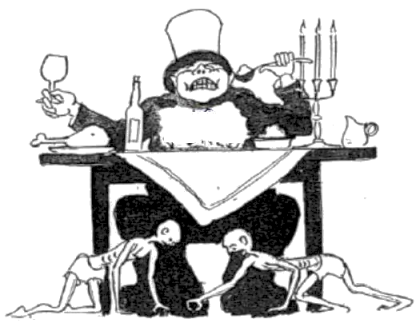 “Voluntary exchanges benefit everyone.” – False. The non-rich have few options, and must accept any deal that keeps them from starving; that’s why the so-called “volunteer army” is actually staffed by a “poverty draft.” And how many people would choose to be migrant farm-workers? But the rich have many options, and can choose just those that make them richer. Thus, every market transaction increases economic inequality, and concentrates wealth into fewer hands. Trickle-down economics doesn’t work — the market, growing ever more efficient, permits ever fewer crumbs to fall.
“Voluntary exchanges benefit everyone.” – False. The non-rich have few options, and must accept any deal that keeps them from starving; that’s why the so-called “volunteer army” is actually staffed by a “poverty draft.” And how many people would choose to be migrant farm-workers? But the rich have many options, and can choose just those that make them richer. Thus, every market transaction increases economic inequality, and concentrates wealth into fewer hands. Trickle-down economics doesn’t work — the market, growing ever more efficient, permits ever fewer crumbs to fall.
PART C: DEVASTATION OR REVOLUTION
 I’ve already explained that the owners of our workplaces and our debts enrich themselves by exploiting the rest of us. A market economy inevitably concentrates wealth into few hands, like the board game of Monopoly, even if everyone plays fairly. And once wealth has become concentrated, you can say goodbye to fair play, and to any notion that separateness is “neutral.” Wealth is power, and power corrupts; that old saying has been verified by the Stanford Prison Experiment and other sociological evidence. People with power over others become less empathic, more authoritarian, more greedy.
I’ve already explained that the owners of our workplaces and our debts enrich themselves by exploiting the rest of us. A market economy inevitably concentrates wealth into few hands, like the board game of Monopoly, even if everyone plays fairly. And once wealth has become concentrated, you can say goodbye to fair play, and to any notion that separateness is “neutral.” Wealth is power, and power corrupts; that old saying has been verified by the Stanford Prison Experiment and other sociological evidence. People with power over others become less empathic, more authoritarian, more greedy.
Perhaps that’s because they feel compelled to justify their power to themselves with some sort of philosophical or historical theory — that they are somehow more deserving, or that their thefts somehow are helping the world. Then their theory perpetuates their antisocial behavior. Lloyd Blankfein, head of Goldman-Sachs, said he was “doing God’s work,” and perhaps he believes it.
(On the other hand, psychopaths feel no need for justification. There is some evidence that psychopathy stems from the childhood traumas of a cruel and uncaring society — again, in our age, a byproduct of capitalism.)
One justification commonly given for power is authoritarianism, the belief that someone needs to be “in charge” of society or it will crash, like a ship without a helmsman. The 17th century philosopher Thomas Hobbes believed that people are basically selfish and greedy; he wrote in his book Leviathan that they would engage in a “war of all against all” unless kept in their place by the iron fist of a strong central authority. Just the opposite is actually true; crime rates in Oakland actually fell during Occupy Oakland. Here is a joke: If three authoritarians are shipwrecked on an island, the first things they will do — even before searching for food or water — are to make some rules and elect a president.
Authoritarian hierarchies give rise to one-way communication: Those at the top say “we know what is good for you, and we don’t need to hear any backtalk.” This may be reassuring to people who crave certainty — but if the system is malfunctioning and someone at the bottom is in pain, people at the top may never hear about it. This one-way communication system results in dogma, and a loss of cultural and intellectual diversity. That makes society less able to cope with new and unfamiliar stresses, such as global warming.
 After wealth becomes concentrated, it becomes self-perpetuating. Wealth rules, not primarily through secret cabals, but by buying the media, framing the issues, and distracting the public from what really matters. Wealth erodes through any government regulations, buying off both legislators and enforcers. Wealth writes loopholes for itself into the tax laws and all the other laws. Wealth twisted the USA’s 14th constitutional amendment into a justification for corporate personhood, and wealth may also twist into ineffectiveness the new amendment to end corporate personhood that is now being proposed by many reformists. Government and business merge, as in Mussolini’s description of fascism. The only way to avoid rule by the wealthy class is to not have a wealthy class.
After wealth becomes concentrated, it becomes self-perpetuating. Wealth rules, not primarily through secret cabals, but by buying the media, framing the issues, and distracting the public from what really matters. Wealth erodes through any government regulations, buying off both legislators and enforcers. Wealth writes loopholes for itself into the tax laws and all the other laws. Wealth twisted the USA’s 14th constitutional amendment into a justification for corporate personhood, and wealth may also twist into ineffectiveness the new amendment to end corporate personhood that is now being proposed by many reformists. Government and business merge, as in Mussolini’s description of fascism. The only way to avoid rule by the wealthy class is to not have a wealthy class.
 Once profit has been enshrined as the ruling principle of society, it wreaks terrible destruction. Bipartisan lies justify wars — depriving millions of life, limb, homes, and any decency or sanity — just to profit the sellers of military goods and services, and to give their friends control over natural resources and cheap labor. Harsh and arbitrary laws are passed to fill prisons for profit. Air, water, and soil are carelessly poisoned by big corporations rushing toward profit. Profits are privatized, but bailouts, subsidies, and other costs are “socialized,” i.e., borne by the taxpayers.
Once profit has been enshrined as the ruling principle of society, it wreaks terrible destruction. Bipartisan lies justify wars — depriving millions of life, limb, homes, and any decency or sanity — just to profit the sellers of military goods and services, and to give their friends control over natural resources and cheap labor. Harsh and arbitrary laws are passed to fill prisons for profit. Air, water, and soil are carelessly poisoned by big corporations rushing toward profit. Profits are privatized, but bailouts, subsidies, and other costs are “socialized,” i.e., borne by the taxpayers.
So separateness is the root problem, and its consequences are varied and terrible. But, what’s more, they’re getting worse, and there isn’t much time left.
That’s most evident in global warming, which is now self-perpetuating and accelerating due to feedback loops — i.e., some of the consequences of global warming are also causes. It’s totally unprecedented in human history, and perhaps even in the history of all life on earth: In just a century we’ve injected into the atmosphere a mass of carbon that nature took millions of years to collect. And now, even if civilization collapses, the feedback loops will continue cooking the planet.
Global warming is now speeding up. Already we can see increases in extreme weather, crop failures, and rising food prices, and those will all get worse. Some plants and animals are migrating to get away from the heat, but they can’t migrate fast enough. And species depend on other species — break a link in the food chain, and much of the chain may be lost. We’re now in earth’s sixth major extinction period. Species are now going extinct far faster than at any time since the disappearance of the dinosaurs, far faster than new species are evolving into existence. And, except for humans, each species is declining in diversity, through either population decline or monoculturing. The decline in biodiversity makes the ecosystem fragile, and less able to cope with stresses such as disease or unfamiliar weather. At some point soon the whole ecosystem may simply collapse, leaving nothing but anaerobic bacteria alive. Then we humans will come to an end — even the rich, for their canned food will run out, and they can’t eat money. Perhaps a few of them will survive for a while in underground farms, but I doubt that they can preserve enough biodiversity to make those viable for long.
To survive, it’s not enough for us simply to “get ourselves back to the garden.” We’ve damaged the ecosystem so severely that it can’t heal on its own — it will need our help — but this time we must use technology with the ecosystem, not against it. We must quickly implement carbon-negative technologies on a massive scale, to take carbon out of the atmosphere, but that will require some scientific innovation, and it won’t make any private profit for anyone. Thus, we must end capitalism before capitalism ends civilization.
 After the revolution, maybe we’ll be able to restore the viability of the ecosystem. Maybe. But even then, we can’t return to some golden age of innocence. The growth of information is irreversible, unstoppable, and accelerating — that genie can’t be put back into the bottle — and its consequences will be far greater than most people realize. Information is not wisdom; information makes destructive technologies widely available. An authoritarian bully with drones is no deterrent for a suicidal madman employing germ warfare. Hobbes’s Leviathan can no longer maintain order and avert the “war of all against all.”
After the revolution, maybe we’ll be able to restore the viability of the ecosystem. Maybe. But even then, we can’t return to some golden age of innocence. The growth of information is irreversible, unstoppable, and accelerating — that genie can’t be put back into the bottle — and its consequences will be far greater than most people realize. Information is not wisdom; information makes destructive technologies widely available. An authoritarian bully with drones is no deterrent for a suicidal madman employing germ warfare. Hobbes’s Leviathan can no longer maintain order and avert the “war of all against all.”
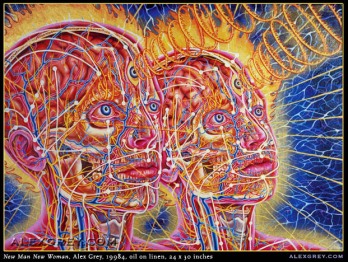 We can only be made safe by a caring culture that heals bullies and madmen, a universal family that leaves no one behind, so that no one wants to hurt others. We must create a culture that has never existed before. The transition to such a culture will be a humongous change, far bigger than anything that has been understood by the term “revolution”; it might be better described as a move to a higher spiritual plane. Nothing less than that wisdom will save us from extinction; nothing more is needed to guide us to utopia; any middle path between those two extremes is closing. Quite honestly, I’m not certain that sharing will work, but it’s clear that nothing else will.
We can only be made safe by a caring culture that heals bullies and madmen, a universal family that leaves no one behind, so that no one wants to hurt others. We must create a culture that has never existed before. The transition to such a culture will be a humongous change, far bigger than anything that has been understood by the term “revolution”; it might be better described as a move to a higher spiritual plane. Nothing less than that wisdom will save us from extinction; nothing more is needed to guide us to utopia; any middle path between those two extremes is closing. Quite honestly, I’m not certain that sharing will work, but it’s clear that nothing else will.
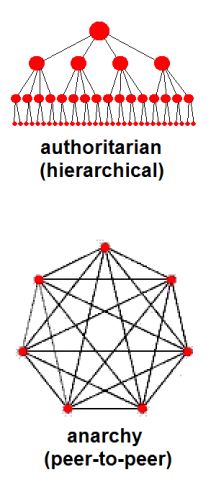 The alternative to hierarchical authority is anarchy — i.e., “no rulers.” Misleading propaganda associates the word “anarchy” with disorder and destruction — and, unfortunately, the Black Bloc has reinforced that view. But actually, most anarchists call for a peaceful, highly ordered society. It’s just that instead of a coercive hierarchy, they want a peer-to-peer, horizontalist, voluntary, cooperative network. Anarchists employ two-way, caring communication, which is the only effective way to know what is really going on with other people.
The alternative to hierarchical authority is anarchy — i.e., “no rulers.” Misleading propaganda associates the word “anarchy” with disorder and destruction — and, unfortunately, the Black Bloc has reinforced that view. But actually, most anarchists call for a peaceful, highly ordered society. It’s just that instead of a coercive hierarchy, they want a peer-to-peer, horizontalist, voluntary, cooperative network. Anarchists employ two-way, caring communication, which is the only effective way to know what is really going on with other people.
Authoritarians, observing Occupy Wall Street or other examples of anarchism, are surprised that anything can get done without someone being “in charge.” What they have not understood is that shared values, goals, and concerns are “in charge.” Indeed, after Superhurricane Sandy devastated New York and New Jersey, the Federal Emergency Management Agency found its hierarchical methods so ineffective by comparison that FEMA ended up subordinating itself to the Occupy movement.
For introductions to the theory of self-organizing, I would recommend the books Anarchy Works and The Leaderless Revolution. That people actually do self-organize and cooperate, given the need and the opportunity, has been amply illustrated by Rebecca Solnit’s book A Paradise Built in Hell. and by the Occupy movement.
How will we make the great changes that we need? One friend of mine, growing impatient, told me that she’d like to buy a gun and “take out” some of the people who are causing all our problems. I told her that, aside from any ethical considerations, her plan was entirely impractical: She would never get close enough to any of the important people — but even if she did manage to eliminate one, he would quickly be replaced by someone with similar policies but better protected. It’s like the Hydra all over again. Moreover, any use of force on our part will give the machine a pretext for increased authoritarianism. And even if we somehow manage to overthrow the entire oligarchy, the culture of separateness will just generate a new oligarchy. We must change the culture, and that can’t be done by force; people will only change their worldview voluntarily. “I hope someday you’ll join us,” John Lennon sang.
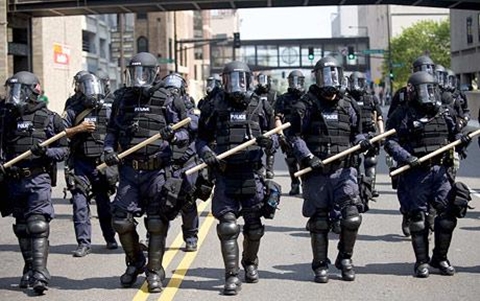 We must accept the reality that, at least initially, people speaking of new ideas will need great courage, for they will be beaten down violently. But police and soldiers remain human beings, despite all their training. They’ll join us when they realize they’ve been fighting on the wrong side. The rich are powerful only through our social arrangements — they’re not powerful in their own right, like Superman or Thor. The bureaucracy of brutality will fall without a shot when its workers awaken and walk out, when we cease to honor the pieces of paper held by the rich, asserting that they “own” everything. We just have to get ourselves organized.
We must accept the reality that, at least initially, people speaking of new ideas will need great courage, for they will be beaten down violently. But police and soldiers remain human beings, despite all their training. They’ll join us when they realize they’ve been fighting on the wrong side. The rich are powerful only through our social arrangements — they’re not powerful in their own right, like Superman or Thor. The bureaucracy of brutality will fall without a shot when its workers awaken and walk out, when we cease to honor the pieces of paper held by the rich, asserting that they “own” everything. We just have to get ourselves organized.
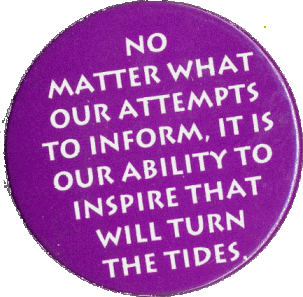 Some people say “too much talk, it’s time for action,” but talk really is the most important kind of action we can take right now: We need to increase the size of the movement, and increase the understanding of both those within the movement and those we’re trying to recruit. Revolution is not enough; it needs to be the right kind of revolution.
Some people say “too much talk, it’s time for action,” but talk really is the most important kind of action we can take right now: We need to increase the size of the movement, and increase the understanding of both those within the movement and those we’re trying to recruit. Revolution is not enough; it needs to be the right kind of revolution.
If you like this essay, please send the link to other people. But this essay is mostly concerned with facts, and we need a lot more than just facts. After all, we all have different trusted sources for what we believe to be facts, and trust can’t be won through debate. So we need to build friendship and inspiration. To change the culture, we must see the world more clearly, and react to it honestly and articulately. The hardest part of that is to see ourselves more clearly, and overcome lifelong habits and misconceptions.
Perhaps we’re not yet ready to live in a completely new way, and we’ll need to go through some sort of transition first. But there is no reason to delay or compromise in urging people to think about a completely new way of life. “Imagine all the people sharing all the world,” John Lennon sang — and, indeed, just getting people involved in imagining the new world, seeing that it is possible, dispelling the denials, is a good way to begin. Join the conversation — we’re all on the planning committee.
[In the transcript of this essay, the underlined blue phrases are links to related materials. To get to the transcript, first go to LeftyMathProf dot org, and then click on “The Root Problem.” Peace, and be well.]
ABOUT THE AUTHOR
A. The Culture of Separateness / B. Exposing Capitalism / C. Devastation or Revolution (including intro to anarchy).


 conservative movie audiences back in the early 1970s?
conservative movie audiences back in the early 1970s?


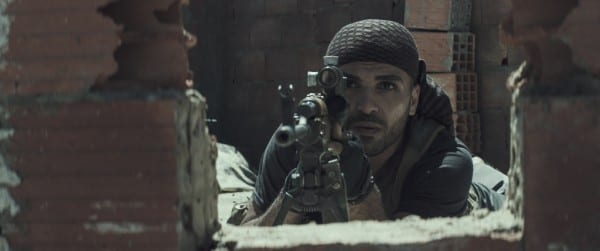



 Many people feel overwhelmed, because our problems seem so numerous —
Many people feel overwhelmed, because our problems seem so numerous —
 everything of importance, and that’s still our
everything of importance, and that’s still our  This attitude isn’t greedy: It doesn’t demand anything from others. Its symmetry makes it an instance of the Golden Rule, “treat others as you wish to be treated,” often touted as our society’s highest morality, but it’s a rather negative version of that rule: I won’t care about you, and I don’t wish for you to care about me. Ayn Rand presented selfishness as a logical philosophy, and independence as a heroic way of life. Her followers believe that it’s possible to respect other people without actually caring about them or being interdependent with them — but they’re mistaken. When we don’t care about something, we see it as an object to be used.
This attitude isn’t greedy: It doesn’t demand anything from others. Its symmetry makes it an instance of the Golden Rule, “treat others as you wish to be treated,” often touted as our society’s highest morality, but it’s a rather negative version of that rule: I won’t care about you, and I don’t wish for you to care about me. Ayn Rand presented selfishness as a logical philosophy, and independence as a heroic way of life. Her followers believe that it’s possible to respect other people without actually caring about them or being interdependent with them — but they’re mistaken. When we don’t care about something, we see it as an object to be used. And although most people in our society see Ayn Rand for the
And although most people in our society see Ayn Rand for the  As I’ve already remarked, the habit of private property generates a philosophy of unconcern. Conversely, that philosophy justifies private property. Thus, the economy and psychology generate each other; I’ll refer to them both as separateness.
As I’ve already remarked, the habit of private property generates a philosophy of unconcern. Conversely, that philosophy justifies private property. Thus, the economy and psychology generate each other; I’ll refer to them both as separateness. Yahweh never answered Cain’s question, but I would answer yes, you should be your brother’s keeper, and he should be yours. Still, I am not advocating self-denial, self-sacrifice, self-crucifixion. You are a part of the global community, and you deserve comfort and happiness as much as anyone else does. I just want you to see that your comfort and happiness are not separate from everyone else’s.
Yahweh never answered Cain’s question, but I would answer yes, you should be your brother’s keeper, and he should be yours. Still, I am not advocating self-denial, self-sacrifice, self-crucifixion. You are a part of the global community, and you deserve comfort and happiness as much as anyone else does. I just want you to see that your comfort and happiness are not separate from everyone else’s. As your property is separate from mine, we must exchange things; we must have a market. But the market is not as it seems. A false mythology is perpetuated by
As your property is separate from mine, we must exchange things; we must have a market. But the market is not as it seems. A false mythology is perpetuated by  “People would quit working if we switched to guaranteed incomes; the economy would collapse.” – False, but with a qualification. People would quit if we switched to guaranteed incomes and no other changes were made. That’s because the jobs, presently structured to benefit the owners, are
“People would quit working if we switched to guaranteed incomes; the economy would collapse.” – False, but with a qualification. People would quit if we switched to guaranteed incomes and no other changes were made. That’s because the jobs, presently structured to benefit the owners, are  “The desire for personal gain is the source of all creativity and innovation, which makes the world a better place. Capitalism is smart, because it harnesses greed for the good of all.“– False. Bargaining with the devil is stupid, because it always ends badly; you’re the one who will end up in the harness, and not for the good of all.
“The desire for personal gain is the source of all creativity and innovation, which makes the world a better place. Capitalism is smart, because it harnesses greed for the good of all.“– False. Bargaining with the devil is stupid, because it always ends badly; you’re the one who will end up in the harness, and not for the good of all. 
 “Surely the problem is only in big businesses; there is nothing wrong with small businesses like the Mom-and-Pop grocery store on the corner, engaging in a bit of healthy competition.” – False. Capitalism grows like cancer. The Little Prince explained that every baobab must be weeded out while it is still small, or the resulting giant baobab would destroy his little planet. Even the Mom-and-Pop store perpetuates the idea of our separateness. Will Mom and Pop give free groceries to the man who just got laid off? That won’t be enough. What we need is not charity, but solidarity. Small businesses often do behave honorably, but that’s in spite of capitalism, not because of it. Their legitimacy is co-opted by big businesses, which then crush and swallow the small ones. And big and small can’t be separated, because they swim in the same sea of competition. And nearly all of our society has been persuaded that competition is good for us, but that’s the exact opposite of the truth; there is no such thing as “healthy competition.” I don’t even know where to begin on the subject of competition — it deserves an entire essay — so I’m just going to refer you to Alfie Kohn’s excellent hour-long lecture,
“Surely the problem is only in big businesses; there is nothing wrong with small businesses like the Mom-and-Pop grocery store on the corner, engaging in a bit of healthy competition.” – False. Capitalism grows like cancer. The Little Prince explained that every baobab must be weeded out while it is still small, or the resulting giant baobab would destroy his little planet. Even the Mom-and-Pop store perpetuates the idea of our separateness. Will Mom and Pop give free groceries to the man who just got laid off? That won’t be enough. What we need is not charity, but solidarity. Small businesses often do behave honorably, but that’s in spite of capitalism, not because of it. Their legitimacy is co-opted by big businesses, which then crush and swallow the small ones. And big and small can’t be separated, because they swim in the same sea of competition. And nearly all of our society has been persuaded that competition is good for us, but that’s the exact opposite of the truth; there is no such thing as “healthy competition.” I don’t even know where to begin on the subject of competition — it deserves an entire essay — so I’m just going to refer you to Alfie Kohn’s excellent hour-long lecture,  “Voluntary exchanges benefit everyone.” – False. The non-rich have few options, and must accept any deal that keeps them from starving; that’s why the so-called “volunteer army” is actually staffed by a “poverty draft.” And how many people would choose to be migrant farm-workers? But the rich have many options, and can choose just those that make them richer. Thus, every market transaction increases economic inequality, and concentrates wealth into fewer hands. Trickle-down economics doesn’t work — the market, growing ever more efficient, permits ever fewer crumbs to fall.
“Voluntary exchanges benefit everyone.” – False. The non-rich have few options, and must accept any deal that keeps them from starving; that’s why the so-called “volunteer army” is actually staffed by a “poverty draft.” And how many people would choose to be migrant farm-workers? But the rich have many options, and can choose just those that make them richer. Thus, every market transaction increases economic inequality, and concentrates wealth into fewer hands. Trickle-down economics doesn’t work — the market, growing ever more efficient, permits ever fewer crumbs to fall. I’ve already explained that the owners of our workplaces and our debts enrich themselves by exploiting the rest of us. A market economy inevitably concentrates wealth into few hands, like the board game of
I’ve already explained that the owners of our workplaces and our debts enrich themselves by exploiting the rest of us. A market economy inevitably concentrates wealth into few hands, like the board game of  After wealth becomes concentrated, it becomes self-perpetuating. Wealth rules, not primarily through secret cabals, but by buying the media, framing the issues, and distracting the public from what really matters. Wealth erodes through any government regulations, buying off both legislators and enforcers. Wealth writes loopholes for itself into the tax laws and all the other laws. Wealth twisted the USA’s 14th constitutional amendment into a justification for corporate personhood, and wealth may also twist into ineffectiveness the new amendment to end corporate personhood that is now being proposed by many reformists. Government and business
After wealth becomes concentrated, it becomes self-perpetuating. Wealth rules, not primarily through secret cabals, but by buying the media, framing the issues, and distracting the public from what really matters. Wealth erodes through any government regulations, buying off both legislators and enforcers. Wealth writes loopholes for itself into the tax laws and all the other laws. Wealth twisted the USA’s 14th constitutional amendment into a justification for corporate personhood, and wealth may also twist into ineffectiveness the new amendment to end corporate personhood that is now being proposed by many reformists. Government and business  Once profit has been enshrined as the ruling principle of society, it wreaks terrible destruction. Bipartisan
Once profit has been enshrined as the ruling principle of society, it wreaks terrible destruction. Bipartisan  After the revolution, maybe we’ll be able to restore the viability of the ecosystem. Maybe. But even then, we can’t return to some golden age of innocence. The growth of information is irreversible, unstoppable, and accelerating — that genie can’t be put back into the bottle — and its consequences will be far greater than most people realize. Information is not wisdom; information makes destructive technologies widely available. An authoritarian bully with drones is no deterrent for a suicidal madman employing germ warfare. Hobbes’s Leviathan can no longer maintain order and avert the “war of all against all.”
After the revolution, maybe we’ll be able to restore the viability of the ecosystem. Maybe. But even then, we can’t return to some golden age of innocence. The growth of information is irreversible, unstoppable, and accelerating — that genie can’t be put back into the bottle — and its consequences will be far greater than most people realize. Information is not wisdom; information makes destructive technologies widely available. An authoritarian bully with drones is no deterrent for a suicidal madman employing germ warfare. Hobbes’s Leviathan can no longer maintain order and avert the “war of all against all.” We can only be made safe by a caring culture that heals bullies and madmen, a universal family that leaves no one behind, so that no one wants to hurt others. We must create a culture that has never existed before. The transition to such a culture will be a humongous change, far bigger than anything that has been understood by the term “revolution”; it might be better described as
We can only be made safe by a caring culture that heals bullies and madmen, a universal family that leaves no one behind, so that no one wants to hurt others. We must create a culture that has never existed before. The transition to such a culture will be a humongous change, far bigger than anything that has been understood by the term “revolution”; it might be better described as  The alternative to hierarchical authority is anarchy — i.e., “no rulers.” Misleading propaganda associates the word “anarchy” with disorder and destruction — and, unfortunately, the Black Bloc has
The alternative to hierarchical authority is anarchy — i.e., “no rulers.” Misleading propaganda associates the word “anarchy” with disorder and destruction — and, unfortunately, the Black Bloc has  We must accept the reality that, at least initially, people speaking of new ideas will need great courage, for they will be beaten down violently. But police and soldiers remain human beings, despite all their training. They’ll join us when they realize they’ve been
We must accept the reality that, at least initially, people speaking of new ideas will need great courage, for they will be beaten down violently. But police and soldiers remain human beings, despite all their training. They’ll join us when they realize they’ve been 